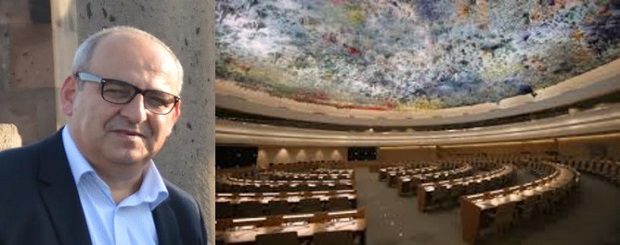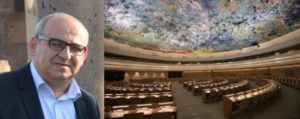
Academician Martik Gasparyan – at the 43rd session of the UN Human Rights Council (UN HRC)
Speech by the nominee of the Nobel Prize in Economics and 2020 Nobel Peace Prize
Academician Martik Gasparyan
at the 43rd session of the UN Human Rights Council (UN HRC)
March 03, 2020 – Выступление номинанта Нобелевской премии 2020 г. по Экономике и Мира на 43 сессии Совета ООН по правам человека СПЧ – 03.03.2020 – 2
at the UN European Headquarters in Geneva
Academician Martik Gasparyan: “Violation of the right to use one’s native language and threats to preserve cultural heritage is a gross element of human rights violation and the main obstacle to dialogue between different cultures”
“I learned the language of Armenians … to understand
how and what language the gods spoke …
for Armenian is the language of the gods … ”
Lord Byron: “Armenian Exercises and Poetry”
Dear Chairperson, Ms. Michelle Bachelet!
Ladies and gentlemen!
Speaking at the opening of the 43rd session of the UN Human Rights Council on February 25 here in Geneva, UN Secretary-General Antonio Guterres addressed a “Call for Action” in the field of human rights protection, insisting that all countries take concrete steps immediately actions for the balanced promotion of the development of all human rights.
This UN call has seven dimensions. Firstly, it is the promotion of human rights through the implementation of the UN goals for sustainable development. In addition, as he noted, in areas such as conflict resolution, disaster management, promoting public participation, equal attention to the rights and interests of future generations, as well as addressing new human rights challenges arising from the development of information technology, are also necessary joint efforts of all countries and immediate action.
The UN High Commissioner for Human Rights M. Bachelet at the opening of the session expressed her appreciation and welcome to the appeal of A. Guterres, calling it a reaffirmation and commitment to the principles and goals in the field of human rights.
I will begin my presentation by referring to the UNESCO Universal Declaration on Cultural Diversity of November 9, 2001, which clearly emphasizes the need to ensure the full extent of economic, social and cultural human rights. These rights include the rights related to the native language of a person and the cultural heritage of a nation, peoples and nationalities. Since the native language and the heritage of any nation is the core of its culture, it is necessary in any state to give full freedom to native speakers: to preserve the language, create it, disseminate it in the education system and in the formation of the culturological face of every person, regardless of to the majority or minority of the national or ethnic composition of one or another nation.
In this context, it is vital for a native speaker of any language and defenders of the identity of each culture to observe the following principles of human rights:
Sewn up linguistic and cultural diversity, which is a beacon, an inseparable treasury of the dignity of the human person.
Language and cultural rights are an integral part of human rights that are universal, inseparable and interdependent.
Each person has a full set of rights, without any obstacles, pressures or restrictions arising from narrowly national approaches, for self-expression, creativity, education and the dissemination of his achievements in various fields of science, art and culture in his native language.
As rightly emphasized in the book “On the Essence of Civilization and on the Importance of its Elements” by the Ukrainian philosopher and culturologist A. Metlinsky, published in Kharkov in Russian in 1837 in the Russian language: “Language is one of the most important reasons that drive and manifest development; it is the seal of the originality of this development, the guarantee of the existence of a nationality, it grows together, it prints and reflects every step, every barely noticeable point of national improvement ”(p. 39).

This is precisely the meaning of language as one of the basic foundations of the unity of Civilization and the culture of the people. On December 2, 1816, an English romantic poet who conquered the world with his work, Lord Byron arrived at the Mkhitarist monastery in Venice to study the Armenian language. With the help of the abbots of the monastery of the island of St. Lazar, the poet was actively acquainted with the Armenian manuscripts and spoke with great admiration about the Armenian culture.
Harutyun’s father taught him the Armenian language and together they created the “Grammar of English and Armenian languages”. Byron gathered his exercises in Armenian writing in the book “Lord Byron Armenian Exercises and Poetry”. Here is what the poet wrote about the Armenian language: “I learned the language of Armenians … to understand how and what language the gods spoke … for Armenian is the language of the gods …
In fact, if we study what is happening in many countries of the world where the official policy of nationalist governments is closed in their narrow linguistic “I”, we will see that there are gross violations of the rights of centuries-old native speakers, alienation and appropriation of the heritage of minorities by the state-forming the people of the subject of law. There is not enough time here to provide numerous examples in the framework of the educational system and cultural policy of many countries from all over the world.
Resolutions, UN Charter, and especially UNESCO, make clear the protection of the rights of language and diverse cultures, but these resolutions do not have a legal mechanism that is applicable to states that violate these rights. It is imperative to recognize that violation of the right to use one’s native language, threats and challenges to preserve cultural heritage are a gross element of violation of human rights and the main obstacle to a constructive dialogue between diverse cultures.
And in order to firmly protect these rights, it is necessary to create a new legal mechanism that, on the one hand, would be seriously funded, and on the other, would punish those parties that violate these rights. In this regard, at this respected meeting I have four specific proposals that will be initiated on March 22-25, 2020 in the city of Shushi, the cultural capital of the Republic of Artsakh, at the International Scientific and Practical Conference on the topic: “Genocidal behavior of Azerbaijan: history and modernity” (from the political and legal assessment to the international court) ”, dedicated to the 100th anniversary of the massacre of the Armenian population of Shushi:
Offer 1
I would like to note that for many years studying the regulatory legal documents of international law and law enforcement before the Roerich Pact and after, UN conventions, UNESCO, interstate treaties for the preservation of cultural heritage (the language of the indigenous people) led to the conclusion that there is a legal vacuum in international law in the protection of the cultural heritage (mother tongue) of one nation and people (non-state-forming or minority) in the territory of another subject of international law in peacetime, from terrorism and military operations.
I propose initiating the beginning of a legal analysis of information, the development of materials and the preparation of documents on the protection and protection of the cultural heritage, the mother tongue of one people (or nation) in the territory of another state with the annual presentation of the results to the UN General Assembly. The experience of many countries shows that the more heritage objects are inventoried, evaluated and entered in the Register of the country, the more the country is attractive for investments.
Offer 2
I always called on the heads of state and government, lawmakers to pay close attention to the issues of language and cultural development of the nation and to bring Culture in their countries to the highest level. After all, any country is great in that it has contributed to the treasury of civilization.
I am not a popularizer of culture, language, music or any other kind of art. I do not tell jokes or jokes, I do not try to simplify the perception of art and music, language. I have a completely different task – to spiritually tune a person to that wave, to the radiation that comes from the works of art and language: poetry, music, literature, painting … Every great art is a transmitter, and a person who is not tuned to its frequency – his tongue is a spoiled receiver. I suggest to repair it.
As an expert in the world economy, auditor, appraiser, financial and economic forensic expert and qualimetrologist, he was convinced for a long time that if each country, planning its own budget, wrote number one as CULTURE and LANGUAGE (to put it simply), then all other areas would automatically rise to a substantial level.
Thus, a statistical analysis shows that 1% of the added expenses for culture and language preservation are comparable with 15% for health care and 25% for education.
Since the elections of the President and the National Assembly will be held in the Republic of Artsakh on March 31, 2020, a new Government will be formed, I propose:
Take a step in the planned budget of the country to allocate for the direction “CULTURE”, if not the first place in terms of funding, then at least an increase of funding from the national budget by 1%.
It seems to me that the heads of government of the UN member states, legislative bodies should support this initiative.
Offer 3
Based on the fact that this year is the anniversary of the UN and UNESCO, and the League of Nations began its work with the Armenian question:
I propose creating the Center for the Dialogue of Civilizations, Cultures, Religions and Language with the Museum of the League of Nation, the UN and UNESCO of the Languages of the World, as well as organize the annual civil society-language forum “Historical Experience in the Dialogue of Civilizations, Cultures, Religions, Languages of the World and the Prospect” on the platform of the museum the formation of an integral socio-cultural system ”and the World Festival of the Arts of the Language of the World.
Thanks for attention!
Academician Martik Gasparyan
03.03.2020
Source: Russian Academy of Natural Sciences
***
Help, ed.
Martik Yurikovich Gasparyan,
President of the International Independent Legal and Scientific Center for Expertise and Assessment of Reparations and Restitution,
Member of the National Assembly (Parliament) of Western Armenia, Chairman of the Special Commission of the Parliament on Restitution and Reparation as a consequence of the Armenian Genocide,
Vice President of the International Academy of Spiritual Unity of the World’s Peoples,
Member of the Eurasian Scientific Expert Council on Science and High Technologies,
Member of the Scientific Council of the Russian Academy of Sciences, Academician of the Russian Academy of Natural Sciences, Russian Academy of Arts, MAADENM and the European Academy “EWAN”, Doctor of Economics, Professor.
